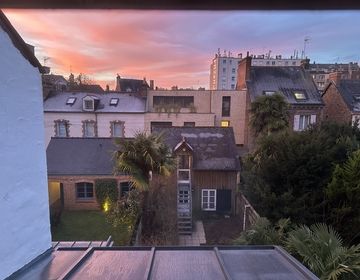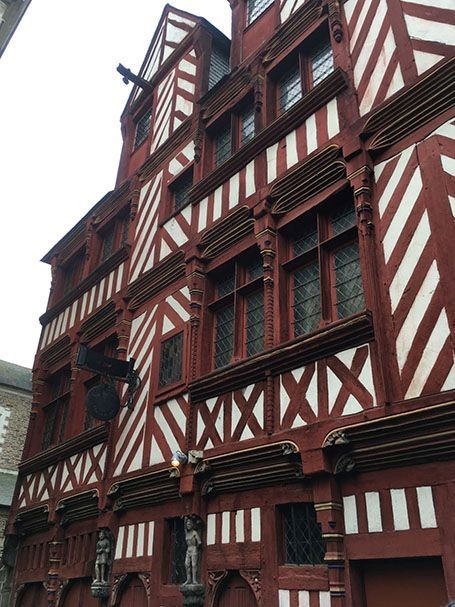Why Rennes when other places are so great too?
When I arrived at college, I knew right away that I wanted to study abroad and as I learned more and more French, it became clear that I wanted to study abroad in France. But when the time came to choose a specific program, I had nearly no idea where I wanted to go. Paris? Montpellier? Grenoble? Rennes? etc. The decision was far from clear at this point. Of course, all of the programs present themselves really well, and at times, they seemed equally good. And this may be true. I’m sure all (or at least most) of the programs have great teachers, are well-organized, have host family options, and good locations (they’re in France, after all)—and merely being in France, in itself, offers the opportunity of language immersion which is, in my opinion, the best way to learn a language. My school in particular had three options already laid-out, all of which would have been wonderful experiences, I am sure, and that was exactly my dilemma. En bref, this blog post is for those who already know they want to study abroad in a french-speaking country and are pretty much certain they want that country to be France. I hope to give you what would have so helped me make my decision. Since coming here, I’ve been asked countless times: Why are you studying in Rennes? Why not Paris, for example? Now that I’ve been here awhile, I can answer. Voici the following list of reasons, in no particular order
- Every student in the program stays with a host family. This is not true for all programs and it’s something I think is very important and has numerous benefits. My own host family has provided me a welcoming and warm home away from home. Their patience with my broken french has been priceless and I have loved getting to enjoy their sense of humor. They have let me into the privacy of their home to see with my own eyes their daily lifestyle, political discussions, family reunions and birthday parties. I believe that if you know a culture from the inside, it is quite difficult to keep it in a box. I can now say for sure that in the privacy of their homes, the French aren’t rude and do not smell, wear stripes and berets or eat croissants every day. However, they do eat a lot of baguette and cheese, drink a lot of wine, and are quite particular, especially when it comes to language and courtesy (vous and tu for example). Also, some of the French do eat McDonalds from time to time, and fat frenchmen exist. My host family has brought me to see how much we have in common as human beings, while also having our cultural distinctions.
- Every student signs a contract to speak only French with CIEE students, staff, and all other French speakers. This is also not the case for every program. I have to say I was somewhat tentative when I signed it, but it’s been a great incentive and a high standard to keep. This doesn’t mean it’s easy or that there aren’t exceptions to the rule, but it certainly has forced me to immerse myself in the language as much as possible even when it is not necessary, to force myself to search for words, grammar structures, taking my time even when it’s frustrating, rather than switching so effortlessly to English.
- Bretagne culture. Unlike the rest of France, Bretagne has a special language called Breton (almost never heard anymore though), a Celtic culture much like Ireland and parts of the UK, and a history that includes the fascinating Anne of Bretagne, who married the King of France, causing Bretagne to finally become part of France in 1532. In Rennes itself, there are still tons of medieval wooden houses, winding cobblestone streets, a strong Breton pride, no toll taxes, and the alleged tomb of Merlin isn’t far away. Bretagne also has the best crêpes in France, galettes, Kouign Amann, Fest Noz, the Breton flag, and cidre.
- To be honest, this was one of the most convincing factors for me when I originally chose Rennes. I knew I wanted to visit Paris, Belgium, the United Kingdom, the Netherlands, and maybe Germany, thus for me, Rennes was almost perfectly located in Europe overall. There are as well many great spots to visit nearby, such as St. Malo, Mont St. Michel, Dinan, Fougères, Vitré and the Châteaux de la Loire. Simply put, the beautiful seacoast is less than an hour train-ride away and Paris is under 2 hours away. Alas, to see mountains, you have to travel farther, but I was able to spend winter break in Switzerland, so it’s definitely still possible.
- L’Institut Franco-Americain: I believe this Institute is one of the few surviving of its kind in all of France. They have a large library of English books and offer special events and English discussion clubs for Americans and French citizens to interact. I have found them indispensable as a resource of English books as I quickly began to miss reading in English and it can be hard to find many even in large public libraries. I currently have 3 books from them. It is also possible to volunteer there.
- There is one simple line of metro, which is spanking new. Compared to Paris’ winding, underground, catacomb-like passages between its numerous lines, Rennes’ system is straight-forward and super clean. There are also frequent buses that are easy to use. For me, I have one bus not far from my homestay that takes me straight to the university in 10-15 minutes or straight to the city-center in the other direction in the same amount of time. Both the metro and the buses are the same company, so only one transportation card is needed. Another benefit that falls under this category is the size of Rennes. For me, it is an ideal size because I can pretty quickly find my way around without getting overwhelmed by the size of a huge city like Paris, while also having plenty to see and visit.
- The University and the Department for International Students: L’Université de Rennes 2 is famous in France for its student strikes, so that one can depend on having the university buildings blocked off—sometimes every Thursday for months on end. If you like having class cancelled (and who doesn’t from time to time?), this can be a perk in itself, but what I find most fascinating are the conversations this provokes around the French philosophy of the right to university, the right to strike, and May 1968, after having just seen this philosophy in action. The conversation is all the more interesting when in the midst of a diverse group of students from multiple nationalities. In my courses at the international department-section of the university, I’ve enjoyed getting to experience being a foreigner with other foreigners, not just Americans, and speaking broken French with Iranians, Russians, Columbians, etc. about shared experiences and observations of the French.
To finish, I would like to address honestly one of the cons of coming to Rennes. One of the big ones is the weather. It is generally mild temperature-wise, but very cloudy and rainy, especially in the winter. It can get kind of dreary after awhile, even if the sun peeps out for a few hours a day. That said, this winter, Paris had serious flooding and the south actually had snow, so I guess Rennes had some of the better weather after all. :)
I hope this helps you make your decision for (or against—it is a free country) the Rennes program. Wherever you go, take advantage of every opportunity, enjoy yourself and others, learn lots of French, and profitez!
Jennifer Migotsky
Wheaton College, MA
Related Posts

A Day In My Life!
Welcome to a day in my life in Rennes, France! Different from my more routine college life in the States, each day in Rennes looks a little different for me... keep reading

Adapting to Life in a Second Language
My plane landed in Rennes four weeks ago, on the morning of January 9th. I’d spent my last three nights in the United States sleeping on the floor of my... keep reading

L'adaptation culturelle et le mal du pays
Je suis arrivée ici à Rennes il y a un peu plus qu’un mois. On a appris, avant d’arriver et pendant l’orientation, qu’il y a des phases de l’adaptation culturelle... keep reading


